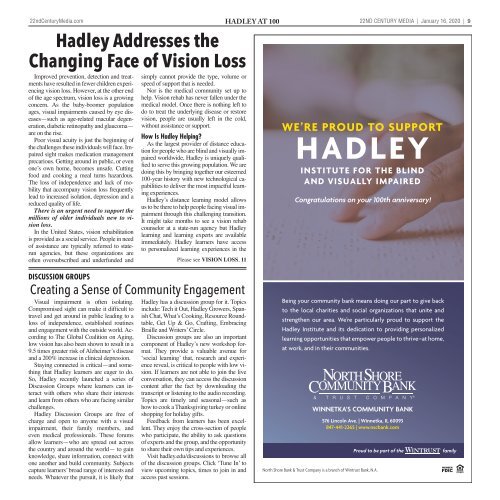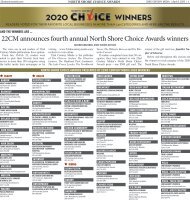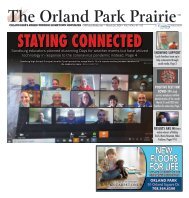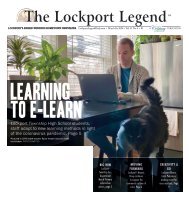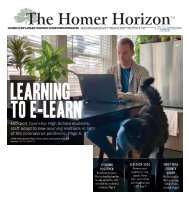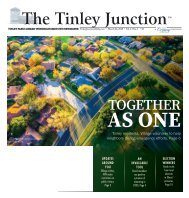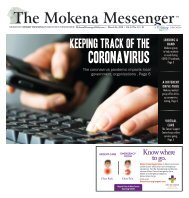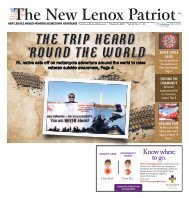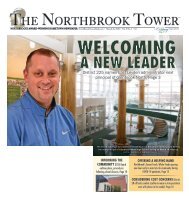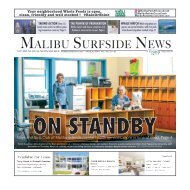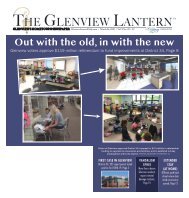You also want an ePaper? Increase the reach of your titles
YUMPU automatically turns print PDFs into web optimized ePapers that Google loves.
22ndCenturyMedia.com <strong>Hadley</strong> at 100<br />
22nd century media | January 16, 2020 | 9<br />
<strong>Hadley</strong> Addresses the<br />
Changing Face of Vision Loss<br />
Improved prevention, detection and treatments<br />
have resulted in fewer children experiencing<br />
vision loss. However, at the other end<br />
of the age spectrum, vision loss is a growing<br />
concern. As the baby-boomer population<br />
ages, visual impairments caused by eye diseases—such<br />
as age-related macular degeneration,<br />
diabetic retinopathy and glaucoma—<br />
are on the rise.<br />
Poor visual acuity is just the beginning of<br />
the challenges these individuals will face. Impaired<br />
sight makes medication management<br />
precarious. Getting around in public, or even<br />
one’s own home, becomes unsafe. Cutting<br />
food and cooking a meal turns hazardous.<br />
The loss of independence and lack of mobility<br />
that accompany vision loss frequently<br />
lead to increased isolation, depression and a<br />
reduced quality of life.<br />
There is an urgent need to support the<br />
millions of older individuals new to vision<br />
loss.<br />
In the United States, vision rehabilitation<br />
is provided as a social service. People in need<br />
of assistance are typically referred to staterun<br />
agencies, but these organizations are<br />
often oversubscribed and underfunded and<br />
simply cannot provide the type, volume or<br />
speed of support that is needed.<br />
Nor is the medical community set up to<br />
help. Vision rehab has never fallen under the<br />
medical model. Once there is nothing left to<br />
do to treat the underlying disease or restore<br />
vision, people are usually left in the cold,<br />
without assistance or support.<br />
How Is <strong>Hadley</strong> Helping?<br />
As the largest provider of distance education<br />
for people who are blind and visually impaired<br />
worldwide, <strong>Hadley</strong> is uniquely qualified<br />
to serve this growing population. We are<br />
doing this by bringing together our esteemed<br />
100-year history with new technological capabilities<br />
to deliver the most impactful learning<br />
experiences.<br />
<strong>Hadley</strong>’s distance learning model allows<br />
us to be there to help people facing visual impairment<br />
through this challenging transition.<br />
It might take months to see a vision rehab<br />
counselor at a state-run agency but <strong>Hadley</strong><br />
learning and learning experts are available<br />
immediately. <strong>Hadley</strong> learners have access<br />
to personalized learning experiences in the<br />
Please see VISION LOSS, 11<br />
WE’RE PROUD TO SUPPORT<br />
HADLEY<br />
INSTITUTE FOR THE BLIND<br />
AND VISUALLYIMPAIRED<br />
Congratulations on your 100thanniversary!<br />
Discussion Groups<br />
Creating a Sense of Community Engagement<br />
Visual impairment is often isolating.<br />
Compromised sight can make it difficult to<br />
travel and get around in public leading to a<br />
loss of independence, established routines<br />
and engagement with the outside world. According<br />
to The Global Coalition on Aging,<br />
low vision has also been shown to result in a<br />
9.5 times greater risk of Alzheimer’s disease<br />
and a 200% increase in clinical depression.<br />
Staying connected is critical—and something<br />
that <strong>Hadley</strong> learners are eager to do.<br />
So, <strong>Hadley</strong> recently launched a series of<br />
Discussion Groups where learners can interact<br />
with others who share their interests<br />
and learn from others who are facing similar<br />
challenges.<br />
<strong>Hadley</strong> Discussion Groups are free of<br />
charge and open to anyone with a visual<br />
impairment, their family members, and<br />
even medical professionals. These forums<br />
allow learners—who are spread out across<br />
the country and around the world— to gain<br />
knowledge, share information, connect with<br />
one another and build community. Subjects<br />
capture learners’ broad range of interests and<br />
needs. Whatever the pursuit, it is likely that<br />
<strong>Hadley</strong> has a discussion group for it. Topics<br />
include: Tech it Out, <strong>Hadley</strong> Growers, Spanish<br />
Chat, What’s Cooking, Resource Roundtable,<br />
Get Up & Go, Crafting, Embracing<br />
Braille and Writers’ Circle.<br />
Discussion groups are also an important<br />
component of <strong>Hadley</strong>’s new workshop format.<br />
They provide a valuable avenue for<br />
‘social learning’ that, research and experience<br />
reveal, is critical to people with low vision.<br />
If learners are not able to join the live<br />
conversation, they can access the discussion<br />
content after the fact by downloading the<br />
transcript or listening to the audio recording.<br />
Topics are timely and seasonal—such as<br />
how to cook a Thanksgiving turkey or online<br />
shopping for holiday gifts.<br />
Feedback from learners has been excellent.<br />
They enjoy the cross-section of people<br />
who participate, the ability to ask questions<br />
of experts and the group, and the opportunity<br />
to share their own tips and experiences.<br />
Visit hadley.edu/discussions to browse all<br />
of the discussion groups. Click ‘Tune In’ to<br />
view upcoming topics, times to join in and<br />
access past sessions.<br />
Being your community bank means doing our part togive back<br />
to the local charities and social organizations that unite and<br />
strengthen our area. We’re particularly proud to support the<br />
<strong>Hadley</strong> Institute and its dedication to providing personalized<br />
learning opportunities thatempowerpeople to thrive–athome,<br />
at work,and in their communities.<br />
WINNETKA’S COMMUNITYBANK<br />
576Lincoln Ave. |Winnetka, IL 60093<br />
847-441-2265 |www.nscbank.com<br />
North ShoreBank &Trust Company is abranchofWintrust Bank,N.A.<br />
Proud to be part of the<br />
family


